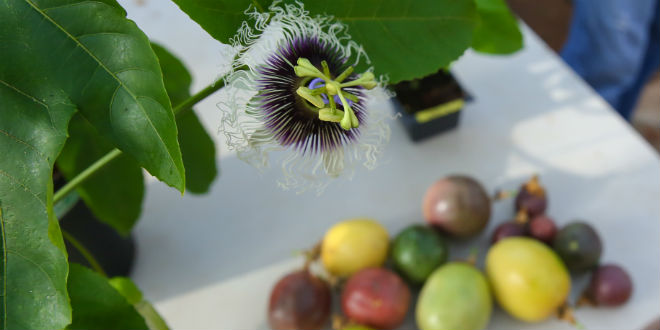Everybody knows that fruits and vegetables are good for you – “an apple a day keeps the doctor away” is one of the the most well-known phrases in the English language.
Just how good they are, however, has traditionally been tough to define, particularly for long-term health. Citrus fruits, for instance, are rich in Vitamin C and effective at warding off diseases like scurvy and winter-time flus, but those are seasonal or situational illnesses.
However, two Hebrew University scientists say a strain of passionfruit they have developed appears to contain effective antioxidants to prevent brain decay as people age.
Prof. Alon Samach, professor of horticulture and Dr. Aron Troen, professor of nutritional neuroscience, both at the Robert H. Smith Faculty of Agriculture, Food and Environment in Rehovot, say the new variety, code named “Dena,” has shown the ability to reduce oxidation damage in the brains of test animals and could show promise against the age-related breakdown sometimes implicated in conditions like Alzheimer’s or Parkinson’s diseases.
“It’s very hard to stop these diseases once they begin to ravage the brain,” Troen told Tazpit Press Service (TPS).“Prevention is our best bet. One way to accomplish that, we believe, is to protect the vascular system from the natural aging process by sustaining the health of the capillaries that provide blood, oxygen and sugar to the brain. Many of the chemicals found in passion fruit are natural antioxidants, which aids that process.”
Troen said that rats, like humans, have advanced memory capabilities. For humans, this means the ability to remember where you parked your cars; in rats, it means remembering an escape route from a maze. He said the by measuring a rat’s ability to remember a maze course as he ages is an accurate measure of the animal’s brain function, and subsequently the rate of its decay.
In addition, rats know how to swim, but they don’t like it. That allows for behavioral testing in a water maze, an accurate measure of the animals’ cognitive function because they are trying as hard as they can to get out of the water. As in dry mazes, passionfruit-fed animals were observed escaping faster than the animals that did not receive the specialized diet.
“If you look at motor behavior, all the 18-month-old animals (very late middle age for a lab rat) are able to move at the same speed as year-old ones. We see that at this stage of aging, their physical abilities have not started to deteriorate, but it takes them longer to escape the maze because their minds aren’t as sharp as they once were.
“However, after six months of eating our passionfruit, the year-and-a-half old animals are seen to be at the cognitive level of year old animals. The fruit has preserved their cognition function. It’s a phenomenal response, one that we believe could have groundbreaking meaning for humans as we all age,” Troen told TPS.
In order to further develop their findings with clinical trials, Samach and Troen say they will require additional investment of up to $20-30 million. It’s a tough demand, particularly for a fruit that in most of the world is seen as an expensive, luxury fruit available mainly to people with financial means. Even more significantly, Israel exports approximately 3,000 metric tons of passion fruit a year, mainly to Europe, a statistical blip in comparison to the more than 800,000 metric tons of fruit grown in world leader Brazil, mainly for domestic consumption.
In addition, passionfruit exports to the United States are highly restricted due to phytosanitary concerns. According to the US Agency for International Development (USAID) only New Zealand, Chile, Bermuda and the Australian state of Tasmania are allowed to supply fresh passion fruit to the US market, with only New Zealand and Bermuda granted unfettered access.
Still, Samach and Troen say they are researching options to expand production in Israel. Traditionally, passionfruit flowers twice a year, in the spring and autumn, when there is sufficient daylight but temperatures have not yet hit summertime highs. With a 20-day gestation period after fertilization in order to reach its final size and two more months to ripen, there are six months a year that passionfruit growers are limited to just half the year to produce the fruit.
In order to address that issue, Samach said his research team is working with multiple varieties of fruit, altering size, color and taste in order to produce the biggest possible fruit with the highest possible nutritional value.
“We believe that will allow us both to expand production and to maximize the value of each passionfruit we produce,” he said. “But if we are going to market the fruits, we have to make sure that they have consistency and marketability.
“Those are all part of the challenges we face, but we don’t believe they are insurmountable. With the new varieties we are producing, in a range of sizes, colors and flavors, we are confident we will be able to provide health food to millions of people that will help preserve their brain function as they age,” Samach said.
The post This Fruit Could Protect Against Alzheimer’s, Say Israeli Researchers appeared first on Breaking Israel News | Latest News. Biblical Perspective..
Source: Israel in the News


